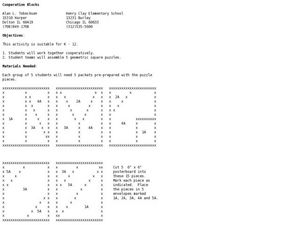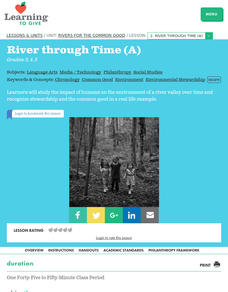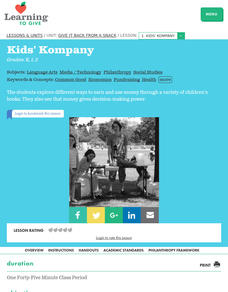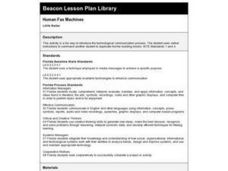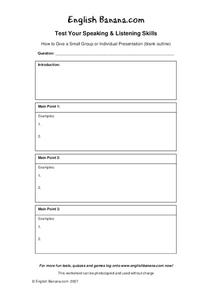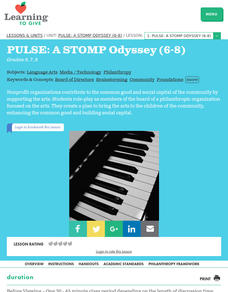Curated OER
Growing Up
Students examine the definitions of philantrophy and common good. They identify non-profit organizations in their community and research organizations that existed in colonial times with the same goal in mind. They create a timeline for...
Curated OER
COOPERATION BLOCKS
Students follow oral instructions in order to make a pattern with wooden blocks.
Curated OER
"An American Story" -- The Responsibility of Citizenship
Students identify examples of philanthropy in a movie. They explain how philanthropic acts contribute to the common good. They discover their rights and responsibilities on being a citizen of the United States.
Curated OER
Advise And Consent Lesson 1: Limits of Power
Students examine the importance of citizens being involved in their community government for the common good. They look at the importance of limiting government and the concepts of philanthropy.
Curated OER
River through Time (A)
Students study the impact of humans on the environment of a river valley over time and recognize stewardship and the common good in a real life example.
Curated OER
River and Us (A)
Students define and demonstrate proper use of common good, preserve (as in clean water) and public good as applicable to clean water.
Curated OER
The Name Game
Students identify acts of philanthropy in different works of literature. They idenify and illustrate examples in colonial America. They also read "Miss Rumphius" on how they can make the world a more beautiful place.
Curated OER
Reaching Out to the Community -- Beyond
Students identify the differences between common good and community capital. They discover their responsibility to contribute to the greater good. They write a letter and design a poster to promote their ideas.
Curated OER
Give It Back From a Snack Lesson 1: Kids' Kompany
Students examine the ways to earn money and discover the different uses for money. They read children's literature and draw pictures of uses for money that benefit the common good.
Curated OER
Projecting the Image -- What Can One Person Do?
Students research individuals who have received the Nobel Peace Prize. They identify the importance of their actions for the common good. They make note of their background, motivations and values.
Curated OER
Super Seniors
Learners research senior citizens who were heroes during the Reconstruction Era. They interview senior citizens who they believe to be heroes and write a biography about them. They explain how small acts can contribute to the common good.
Curated OER
Give Me Your Vital Statistics
Students get to know each other and while giving them an opportunity to practice their logical thinking skills.
Curated OER
Human Fax Machines
Fourth graders discover how to communicate effectively by giving oral directions to make a peanut butter and jelly sandwich. They work with a partner and give oral directions for block building.
Curated OER
Philanthropic Literature: Give a cookie
Students read a book to discover the importance of sharing. They predict what will happen in the story. Students use manipulatives to model the story problem. Students follow instructions, measure ingredients, and make cookies.
Curated OER
Wagons West: Proofreading
Students proofread each others journal entries. In this proofreading lesson, students exchange journal entries to proofread according to instructions given by the teacher. Students will read a different journal each day, giving helpful...
Curated OER
Icky-Icky Sticky!
Students examine the letter 'i'. Through instruction and modeling they explore the sound the letter makes, how the letter is written, words that contain the letter, etc. They identify names of items with the short /i/ sound in them and...
Curated OER
LOU GEHRIG: THE IRON HORSE
Sixth graders review with the teacher from what person the story is written in and how they have reached that conclusion. They brainstorm ten qualities that Gehrig possessed and create a statement that describes him; giving three...
Curated OER
Speaking and Listening
In this speaking worksheet, students write an outline for giving a presentation. The outline includes an introduction and three main points, each with two examples.
Computer Science Unplugged
Marching Orders—Programming Languages
Computers need precise directions to complete a task. Class members experience what it is like to program a computer with an activity that asks one pupil to describe an image while classmates follow the directions to duplicate the picture.
Curated OER
What Does a Philanthropic Organization Do?
Students explore the work of a local nonprofit organization and define "nonprofit" and "profit" organizations. They identify examples of three local philanthropic organizations and work together to draw conclusions about a non-profit...
Curated OER
The Bill of Rights in Times of National Crisis
High schoolers examine the ability of the government to suspend individual rights in times of national crisis. They formulate a constitutional amendment that clearly states if, when, how and by whom the rights of individuals can be...
Curated OER
Pulse: A Stomp Odyssey
Students examine how nonprofit organizations give back to the community. They role-play as members of a board from a philothropic organization. They develop a plan to bring arts back to the community for the benefit of the children.
Curated OER
Good Judgement and Honesty
Seventh graders write about the importance of honesty. In this character education instructional activity, 7th graders reflect about the value of honesty and following the rules. This instructional activity is part of a larger unit on...
Curated OER
Writing to Persuade
Students discover effective writing techniques to create persuasive essays. For this writing lesson, students investigate ways to express facts and points of view through persuasive essays. Finally, the students write their own...



